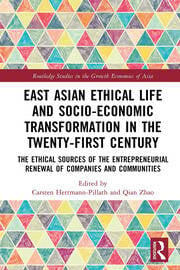Ethical life and business in Korean society during the Joseon dynasty
Eun-Jeung Lee – 2024
Chapter in "East Asian Ethical Life and Socio-Economic Transformation in the Twenty-First Century" Abstract: The “myth of Confucian capitalism” has been frequently cited over the past half century, emphasizing the role of Confucian cultural traditions in research on South Korea’s economic development. In this debate, factors such as relationship/collectivism, discipline/obedience that are seen as uniquely defining Korean Confucian culture were highlighted as having a positive/negative impact on economic development. Meanwhile, the South Korean economy has become dominated by neoliberalism and meritocracy, especially so after the Asian financial crisis at the end of the 20th century. This is fundamentally different from the developmental states known until the 1980s. With it, much of the discussion on fairness and equality and the economic ethics of Confucianism has disappeared. In this chapter, I will examine the debate on economic ethics in the pre-modern society of Korea and the current condition of South Korean economic system and its core culture. Particular focus will be given to the internal contradictions of Confucian thought, which simultaneously emphasizes humanity and meritocracy.

